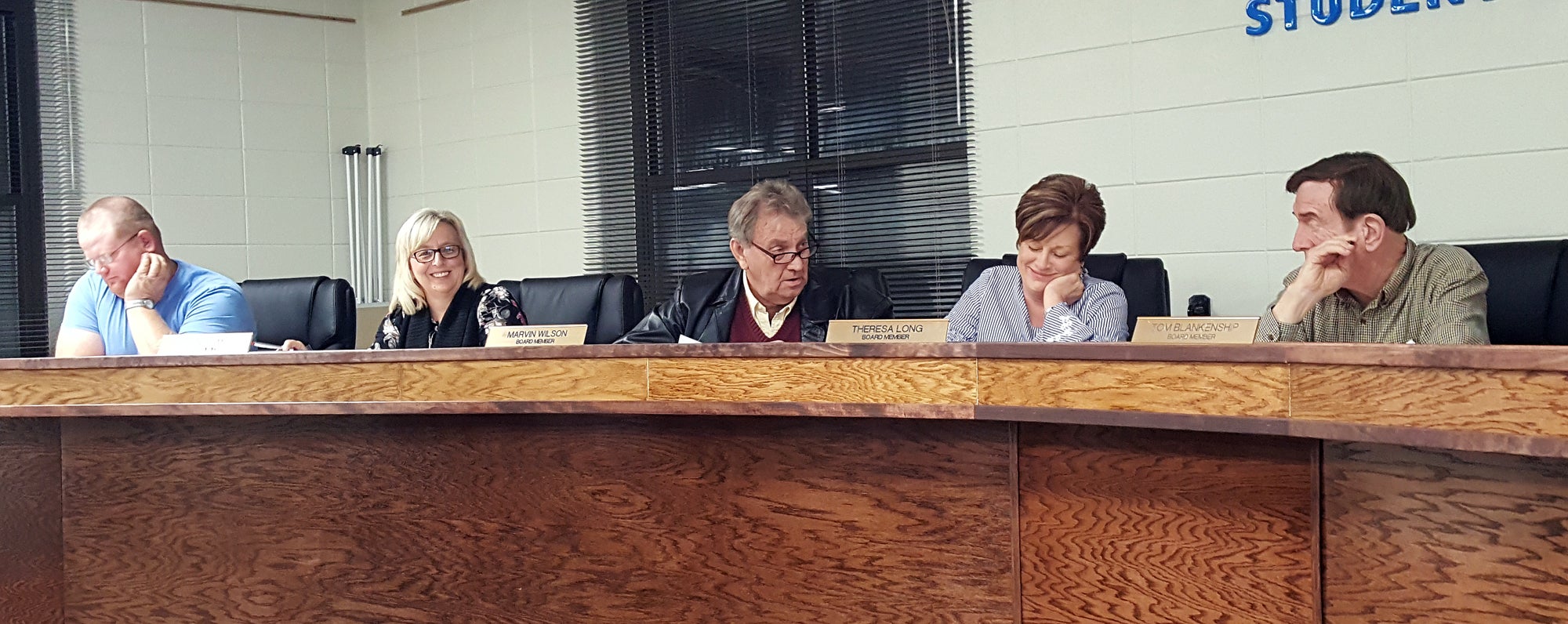School board discusses cost of cellphones, vehicles
Published 2:25 pm Thursday, December 21, 2017

- Photo by Abigail Whitehouse The Lincoln County Board of Education gathers for it's monthly meeting.
STANFORD — The cost of cellphones and vehicles provided by the school district is a topic that has been brought up a few times, according to Lincoln County Superintendent Michael Rowe, which is why he provided school board members with a breakdown of costs associated with both during last week’s meeting.
In total, the district pays for 43 cellphones or devices, the cost of which averages about $2,200 per month — or $26,400 per year. The cellphones are purchased by the individuals and the district pays the cost of the monthly service, Rowe said.
“But after we do the E-rate, which lowers the cost, it’s costing the district around $15,000 per year,” he said.
Rowe provided school board members with a complete list of employees who have district-funded phone plans and identified the plans that are not paid for with money from the general fund.
“For example, Ms. (Cathy) Pleasants phone is paid through Food Service,” he said. “There’s about 10 of those… that will not be coming from the general fund.”
Board Member Alan Hubble asked about fluctuations in totals from month to month.
“For example, I just got a new phone, so I wrote the district a check for $349 because I got the iPhone 8 Plus. So that will add $349 to the bill for this month. Then, of course, Marsha (Abel) will go in and record my part where I paid on it,” he said.
Abel said the cellphones used by Early Headstart and Family Resource and Youth Services Centers (FRYSC) are funded through grants.
“I just billed them for the year. We do it on a yearly basis…” Abel said. “It was $3,400 so that $15,000 you came up with, you can subtract $3,000 from that. So it’s probably $1,000 a month that we’re paying for cellphones.”
District vehicles
There are seven vehicles throughout the district for employees that are considered on-call 24 hours a day, seven days a week for emergencies, Rowe said.
Those employees and their relative duties include:
• Darren Yaden, chief operations officer — facility, technology, bus, food service emergencies;
• Donnie Leigh, director of transportation — bus/safety emergencies;
• Larry Carrier, bus garage manager — bus emergencies; and
• Randy Yocum, Greg Messer, Eric East and Tracy Elliot, mechanics — bus emergencies.
Hubble asked how many emergency calls the district receives in a year and if it would be cheaper to pay mileage on personal vehicles rather than furnishing the vehicles for employees.
“I’m not saying it’s not needed, but if you’re just getting called out five times out of the year, then that’s a lot of extra expense,” Hubble said.
There are four service trucks equipped with specific tools, according to Transportation Director Donnie Leigh.
Leigh said unless the personal vehicle is a utility vehicle, it won’t be able to pull a bus out of a ditch or perform the functions that a service truck can in emergency situations.
“Those vehicles have jumper cables, tools, they have chains to pull buses out,” Leigh said.
The vehicles also have wenches to pull buses out rather than calling a wrecker service, which can cost up to $500 to $600.
“The reason the whole discussion even came up — there’s a $60,000 line item on the budget for gasoline. So, do the math. How many miles do you put on a vehicle in a year’s time to come up with $60,000 worth of gasoline? How many vehicles are we using that’s burning gas?” Hubble said.
Leigh said the board owns around 30 vehicles total.
“I’m not saying all of those are gas, because we just got a truck that is diesel, but I think probably 29 out of 30 of them do run on gas,” Leigh said.
Colleen Benson, administrative assistant and board secretary, expressed the need for the on-call vehicles in relation to after-school programs like the 21st Century Community Learning Center.
“We have kids on buses this time of night,” Benson said. “I’d hate to see this go, quite honestly. This is kind of a needed thing.”





